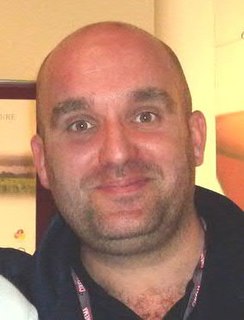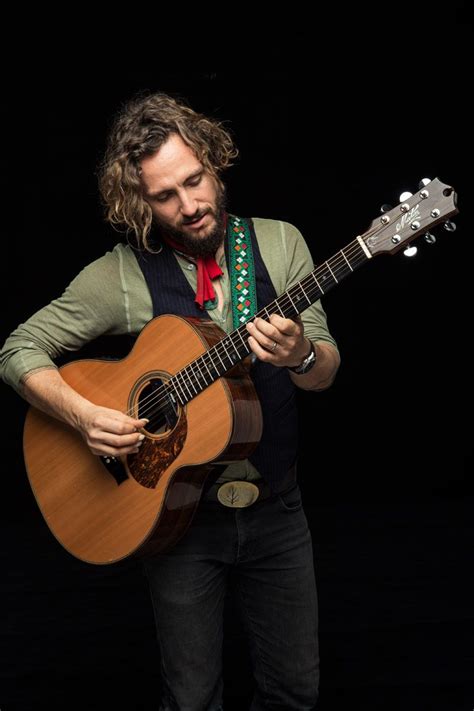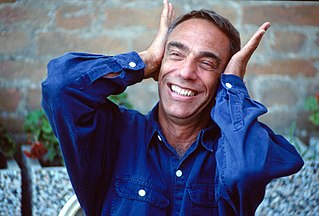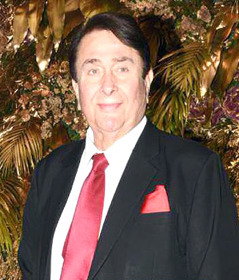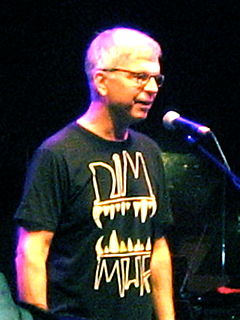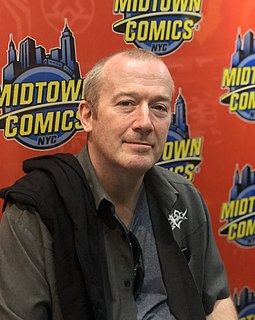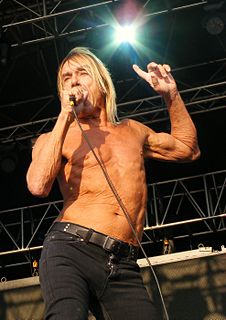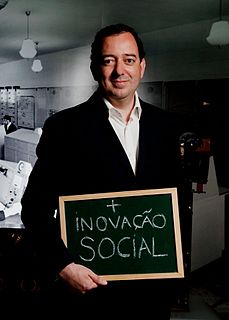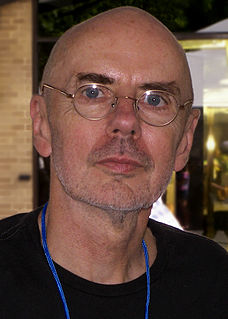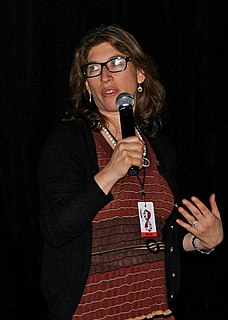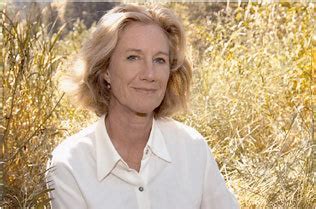Top 274 Eighties Quotes & Sayings - Page 5
Explore popular Eighties quotes.
Last updated on December 20, 2024.
I've always believed that poetry must speak of realities as least as complicated as those spoken of in prose. I've read books of poems, even single poems, which are, for me, at least the equivalent of a short story or a novel. Martin Amis, in an interview with Saul Bellow in the early eighties, quotes Bellow asking, "Why not address 'the mysterious circumstance of being', say what it's like to be alive at this time, on this planet?" This has been and still is my ambition.
At the start of the eighties, Tony and I [Tony Wakefield was one of the original members of DIJ] were involved in radical left politics and beneath it history students. In search of a political view for the future we came across National Bolshevism which is closely connected with the SA hierarchy. People like Gregor Strasser and Ernst Röhm who were later known as 'second revolutionaries' attracted our attention.
I got to watch Frank Capra, in his eighties, in action. You read all the stories about Frank Capra fighting with the head of Columbia, Harry Cohn, "It's my way or the highway." I got to watch that. He lambasted me, "You cannot do this. You will fail." Finally, after another hour of conversation, I convinced him to help me write the speech.
In the Eighties, the landscape was changing. No one knew if they had a future. It's not like now. There was no satellite. Kids were still out on the streets playing all the time. For me, it was the last great hurrah! People don't take those chances anymore. Everyone's far too reserved. Men look like women, women look like men.
Development can indeed continue beyond childhood and youth, beyond the seventies. It can continue until the very end of life, given purposes that challenge and use our human abilities. . . . In sum, our development does not necessarily end at any age. We can continue to develop into our eighties, even to our nineties.
Age puzzles me. I thought it was a quiet time. My seventies were interesting, and fairly serene, but my eighties are passionate. I grow more intense as I age. To my own surprise I burst out with hot conviction. Only a few years ago I enjoyed my tranquility; now I am so disturbed by the outer world and by human quality in general that I want to put things right, as though I still owed a debt to life. I must calm down. I am far too frail to indulge in moral fervor.
When I am working a book, I go through my library and take a look through some of the great cartoonists of the past, like Cliff Sterrett, who did "Polly and Her Pals," or Winsor McCay who did "A Little Nemo in Slumberland," and Herriman - and I just looked through these guys and looked for somebody to steal. You know, looked for who I could swipe, or turn into - who's work I will turn into my work. And I still use, after all these years, these artists as inspirations. So, here in my eighties, I go back to when I was eight for my inspiration.
In the eighties, I was fortunate to be one of the young art directors that Jerry Roach, creative director at JWT New York, took under his wing. He taught me how to use typography more visually, to push against design norms and not to rely on preconceived notions of what something should look like. I learned that nuance is everything and to agonize over the details. I have Jerry to thank for driving plenty of people crazy over the years!
I wouldn't wish the eighties on anyone, it was the time when all that was rotten bubbled to the surface. If you were not at the receiving end of this mayhem you could be unaware of it. It was possible to live through the decade preoccupied by the mortgage and the pence you saved on your income tax. It was also possible for those of us who saw what was happening to turn our eyes in a different direction; but what, in another decade, had been a trip to the clap clinic was now a trip to the mortuary.
In retrospect, it's ridiculous that anyone saw me as a fashion icon, since all I was trying to do was to dumb down my middle-class look by messing with my hair. Throughout the eighties I was invariably half-sure and half-confident about whatever it was I wore…Still, I've always believed—still do—that the radical is far more interesting when it looks benign and ordinary on the outside.
At its best, the US Open demands straight drives, crisp iron shots, brilliant chipping and putting, and strategic position play. Plus the patience of St. Francis and the will of Patton. At its worst, the Open eradicates the difference in ability between a Tom Purtzer and a Tom Watson and throws both in the same jail of high rough and high risk shots. This is the disturbing tendency in the Opens of the seventies and eighties, one which worries everyone in golf.
All that stuff about heavy metal and hard rock, I don't subscribe to any of that. It's all just music. I mean, the heavy metal from the Seventies sounds nothing like the stuff from the Eighties, and that sounds nothing like the stuff from the Nineties. Who's to say what is and isn't a certain type of music?
I had my boundaries and restrictions of doing films so I stopped working in the eighties. This was an era when films were more action oriented. Most of the characters cast in the pivotal roles were either daakus or police inspectors. My face suits neither of these characters. I cannot look like a daaku, so acting had taken a back seat.
In the early eighties, there were a lot of artists involved with the music scene. All those young artists, before their careers took off, were into music. Robert Longo used to play some guitar. He had a band for a while. Basquiat had a band. I mean, people were always trying to mix music and art - in fact, I'm guilty of it myself.
Artur Rubinstein, the famous pianist, was once asked the secret of his success-was it dedication, ability, discipline, hard work? Mr. Rubinstein smiled as he remarked, "It's hard to say, but one thing I do know: if you love life, life will love you back!" What a wonderful insight! That philosophy explains how a man in his eighties can continue to be so creative. For life is simply filled with exciting blessings for everybody. They're ours if we give enough of ourselves to life!
Nobody is excused from the excellence trend. Babies are not excused. Starting right after they get out of the womb, modern babies are exposed to instructional flashcards designed to make them the best babies they can possibly be, so they can get into today's competitive preschools. Your eighties baby sees so many flashcards that he never gets an unobstructed view of his parents' faces. As an adult, he'll carry around a little wallet card that says "7x9=63," because it will remind him of mother.
Even in Madison’s day, the practice of gerrymandering for partisan advantage was familiar. In the late seventeen-eighties, there were claims that Patrick Henry had tried to gerrymander Madison himself out of the First Congress. The term was coined during Madison’s Presidency, to mock Elbridge Gerry, the governor of Massachusetts, who in 1811 approved an election district that was said to look like a salamander.
This much I would say: Socialism has failed all over the world. In the eighties, I would hear every day that there is no inflation in the Soviet Union, there is no poverty in the Soviet Union, there is no unemployment in the Soviet Union. And now we find that, due to Socialism, there is no Soviet Union!
Howard Chaykin was one of the few who dared to make mainstream comics different back in the eighties; it was guys like him, Alan Moore and Frank Miller who made sure there'd be no going back. Howard's work on The Shadow is amongst his very best: razor-sharp character work, sizzling dialogue and an unsurpassed sense of layout and design.
The films that I loved growing up were the science fiction films from the late seventies and early eighties [films], which were more about the people and how they are affected by the environments that they are in. Whether they are sort of futuristic or alien of whatever they are; that was the science fiction that I loved. So that is what we tried to make, the sort of film that felt like those old films.
There's another aspect about the Seventies. Blazing Saddles, as wonderful as it was, sort of hurt the Western. It made such fun of them, that you almost couldn't take them seriously from that point on. That's why only Westerns that had the stink of Watergate or Vietnam could be taken seriously. There were so few Westerns made since then, from the Eighties on, that the few directors who did were so pleased with themselves and so happy to have the opportunity that they got lost in visuals, they got lost in the vistas and the pretty scenery.
In the eighties and nineties, the innovation agenda was exclusively focused on enterprises. There was a time in which economic and social issues were seen as separate. Economy was producing wealth, society was spending. In the 21st century economy, this is not true anymore. Sectors like health, social services and education have a tendency to grow, in GDP percentage as well as in creating employment, whereas other industries are decreasing. In the long term, an innovation in social services or education will be as important as an innovation in the pharmaceutical or aerospatial industry.
I chose to be a photographer twenty-two years ago, but I don't know that I'd make that choice again. Back in the early eighties, I still thought I was doing okay, trying to order and shape the world with my camera. Now that I know a bit more about living and dying, about our planet and its complex problems, I'm a lot less comfortable with my images of people. Still, I haven't a clue what else to do.
In the Sixties, it was mods and rockers, and hippies and casuals, whereas in the early Eighties, there was Goths, punks, mods, skinheads, New Romantics, casuals, metal heads... the streets looked completely different. You go into town now and you can't tell one kid from another - you don't know what they're into. You can sort of tell a skateboard kid because his trousers are half way down his legs, but that's about it. Back then, people wore their hearts on their sleeves. It was a really bold time.
The name came from, erm... us all just agreeing on a name that we liked. There was talk of Swans at first, but there was already a band called Swans, way back in the eighties. An American band. So we thought, well, we can't have them, and I think Andy said, "well what about Doves?" We ruminated it around the three of us and went, well, it's not so bad, it's all right.
During the Reagan eighties, the idea that money was a good thing - it was good to be rich; that wealth was a reflection of your character. We see this today in perceptions of Donald Trump: the idea that money is an expression of success and even goodness. I compare that with my dad's generation, where the American Dream was about giving your kids a better life, but not just in material terms. The American Dream was also about doing something good in the world. The home was at the center of the dream, but home also represented community, shelter, and stability for your family.
I never did use earphones until into the Eighties or Nineties. I don't like to use earphones. I've never heard anybody sing with earphones effectively. They just give you a false sense of security. A lot of us don't need earphones. I don't think Springsteen or Mick do. But other people more or less have given in. But they ought not to. They don't need to. Especially if they have a good band.
If you look back on the period, the 1980s has never been seen as cool. You think of the music, and it always has a kitsch quality to it because everyone looks so ridiculous. Even the Nineties, with The Stone Roses and other bands, was cool before the Eighties. It really missed the boat! The Sixties was always cool, even then. That was my Dad's era and I was always jealous of that. But now, as an adult, looking back, we were part of this mental time. It was the most enormous amount of tribes that could have ever existed in one place.
Let's just call what happened in the eighties the reclamation of motherhood . . . by women I knew and loved, hard-driving women with major careers who were after not just babies per se or motherhood per se, but after a reconciliation with their memories of their own mothers. So having a baby wasn't just having a baby. It became a major healing.
Imagine it's 1981. You're an artist, in love with art, smitten with art history. You're also a woman, with almost no mentors to look to; art history just isn't that into you. Any woman approaching art history in the early eighties was attempting to enter an almost foreign country, a restricted and exclusionary domain that spoke a private language.
The economy and its dismal status is the result of policy decisions that Obama has made and put into place. It's not the quirk of fate. It's not that America's best days are over. It's not that America's past was a fad or a quirk. It's not that the great economic days of the eighties were illegitimate or unreal. It's not that this is the new normal. It's not that all of the greatness in the past was undeserved. It is precisely because of Obama policies implemented since 2009 that this country is in the shape it's in.



